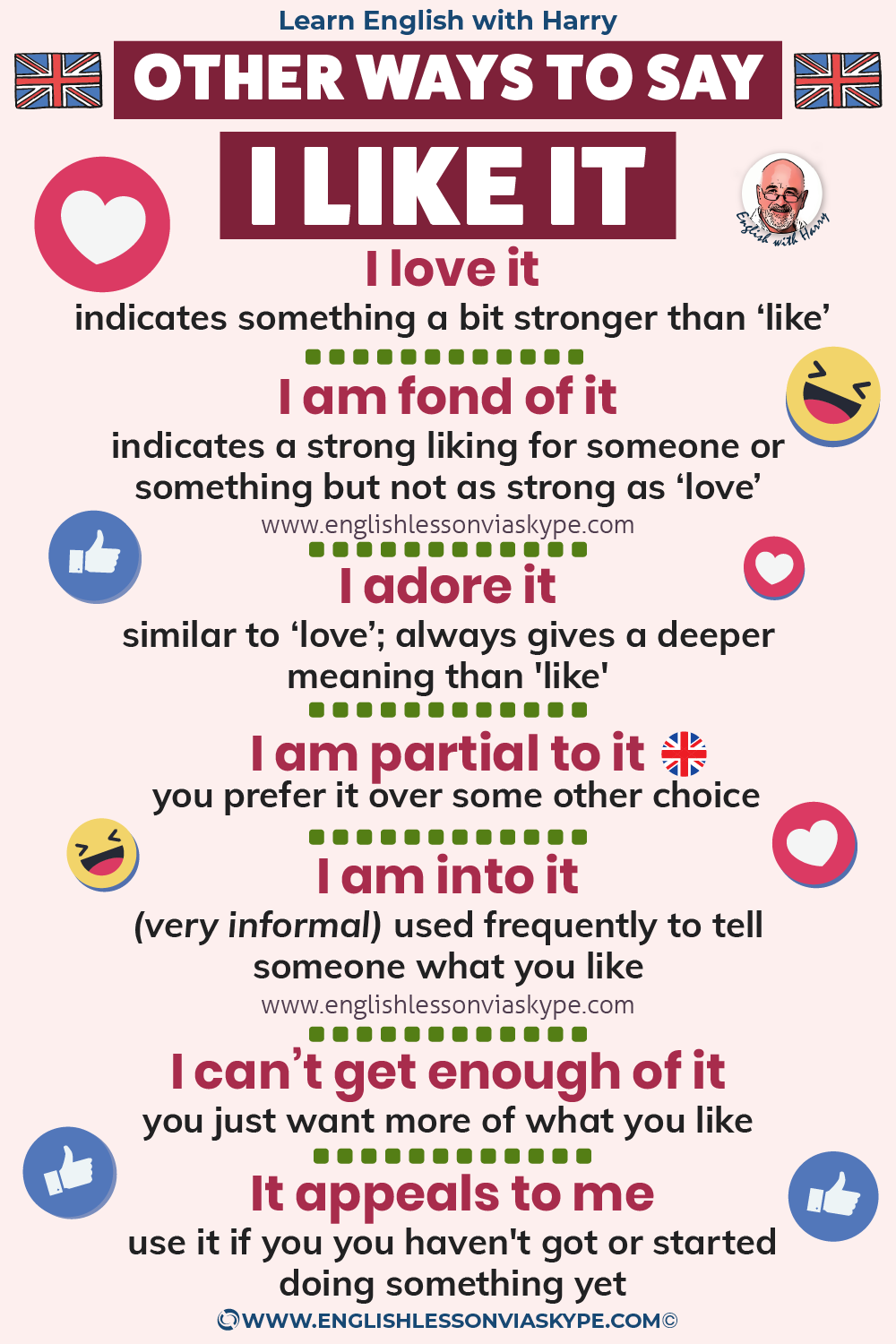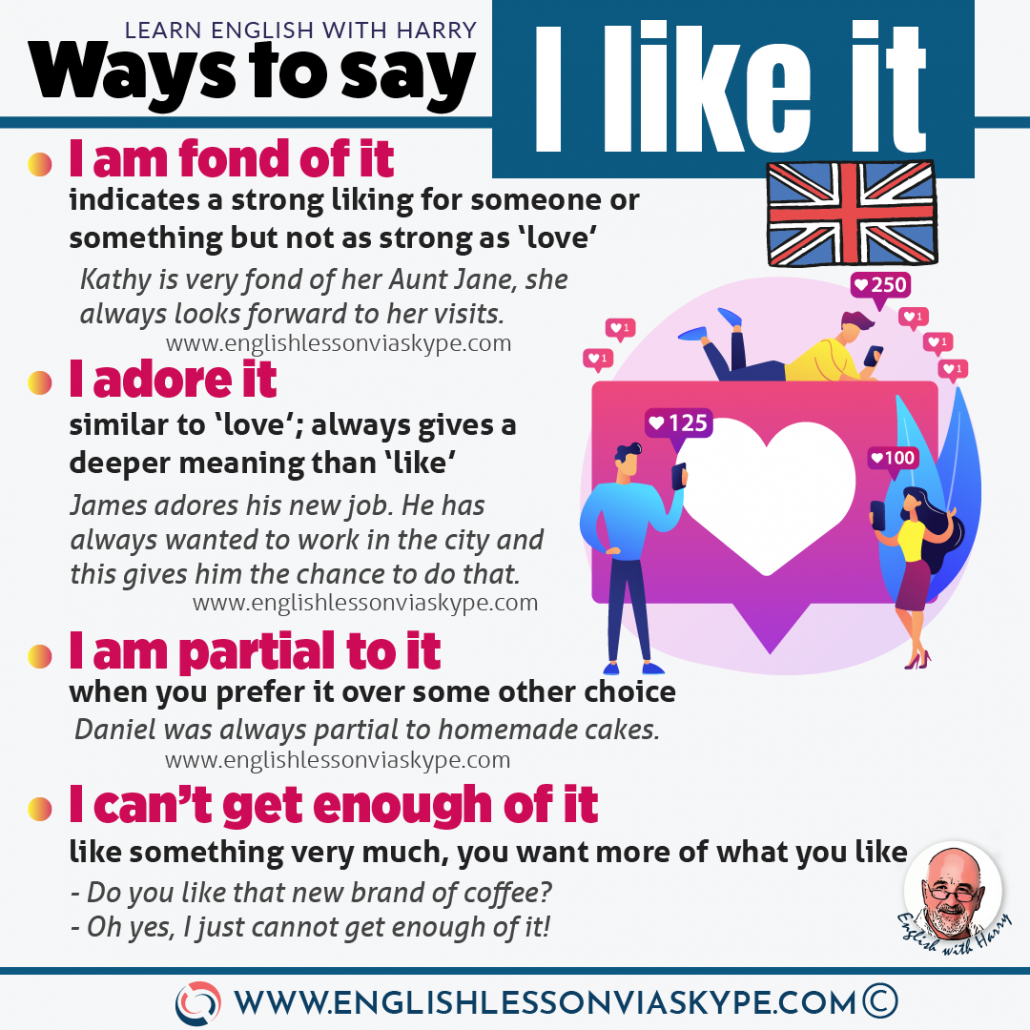Other words for LIKE and why you need to use them.
Avoid using the same words over and over again. Boost your English vocabulary and improve your speaking and writing skills.
Table of Contents
Harry
other words for like in english

The word LIKE is a very popular word in the English language.
We use LIKE as an adjective, a verb and even a noun.
The only bad thing about the verb LIKE is that we use it way too often.
Some students may wonder whether we have any other words for LIKE in English?
In fact, there are many, many ways to say instead of LIKE. So here are some English words and phrases that you can use as alternatives to I LIKE.
Intermediate to Advanced English Marathon

INSANITY: doing the same thing over and over again and expecting different results.
Albert Einstein
- What you'll learn:
- better understanding of more complex grammar structures
- advanced English vocabulary words
- British & American slang
- perfect your listening skills through practing different accents
- This marathon is for you if you're:
- stuck at an intermediate English level
- tired of confusing explanations
- a mature student
- shy & introverted
We use I LIKE to express our feeling about somebody or something. For example:
I like ice cream.
I like Mathew.
Of course, we could add various English adverbs to give more meaning to it. For example:
I really like ice cream.
I really like Mathew.
I genuinely like Mathew.
I totally like her.
But it can be a little boring to always use the same words or expressions so here are some suitable alternative words you can use instead of LIKE.
Other Ways to Say I like it in English
I love
Love indicates something a bit stronger than “like”.
Example:
👱♂️ Would you like a cup of tea?
👩 I would love a cup of tea.
I am fond of
Fond of indicates a strong liking for someone or something but not as strong as “love”.
Example:
Kathy is very fond of her Aunt Jane, she always looks forward to her visits.
I adore
Like ‘love’, ‘adore’ always gives a deeper meaning than ‘like’.
Example:
James adores his new job. He has always wanted to work in the city and this gives him the chance to do that.
I am partial to
A very British English expression. To be partial to something means you prefer it over some other choice.
Example:
Daniel was always partial to homemade cakes. He enjoyed the cakes in the local bakery but a homemade cake was his favourite every time.
Some more informal ways of saying LIKE include the following:
to dig something
This is a very 1960’s or 1970’s expression. People used to ‘dig’ the new music by The Beatles. So this is really something related to the hippy years.
Example:
I dig your outfit.
I am into
Very informal and almost slang expression. This is used frequently to tell someone what you like.
Example:
The teacher asked Kevin what music he liked, ‘I am really into U2, they get it right every time.
I cannot get enough
Again more informal meaning you just want more of what you like.
Example:
👨🦳 Do you like that new brand of coffee?
👱♀️ Oh yes, certainly, I just cannot get enough of it!
Or as Depeche Mode sing I just can’t get enough
Other Words for Like in English
So here are the words we can use instead of LIKE, let’s go through them one more time:
- I love
- I am fond of
- I adore
- I am partial to
- I dig
- I am into
- I cannot get enough

More Information
I am sure you just can’t get enough of our English language learning blog so here are some other interesting posts for you to help you increase your English Vocabulary and improve your knowledge of English Idioms:
English Idioms related to Food
Don’t forget to check out intermediate and advanced English lessons at Learning English with the BBC.
You will love these English lessons

22 Phrasal Verbs for Business
Here you will learn 22 phrasal verbs for business English. These new words will help you expand your English vocabulary


English Vocabulary related to Driving
Here you will learn useful English vocabulary related to driving. Start the engine, exceed the speed limit, go up/down the


Crime and Punishment Vocabulary
Here you will learn important crime and punishment vocabulary words – arson, shoplifting, murder, manslaughter and many more. Crime and